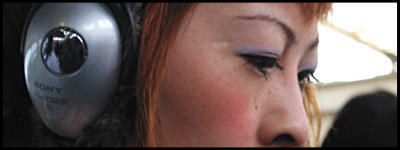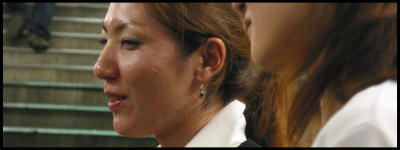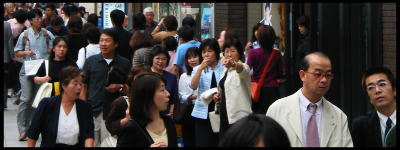 |
|
  09.22.02 09.22.02
click to enlarge





It's starting to get cooler here and many
people are getting sick. There are usually
around two mini flu/cold epidemics per year
here in Tokyo. The last one was in February.
It's very easy to know when something is
going around because of a peculiar social
custom that I've only ever seen here in Japan:
When people are sick they wear surgical masks
in public.
It's a bit shocking the first time you see
it. My first time was about an hour after
arriving in Japan in May, 1998. I was on
the train heading in to Tokyo with my friend
Kevin who had met me at the airport. After
I saw a few people wearing these masks I
asked him what it was all about.
He looked at me with a somber expression
and said, "They're paranoid about
gas
attacks."
"Gas attacks?" I inquired.
"Yeah, do you remember a couple of years
ago when that cult released sarin nerve gas
on to a train and killed about 10 people?
Well, it freaked everyone out, so now lots
of people wear these masks."
I believed him for about a week. I know it
sounds stupid now, but you got to cut me
some slack on this one. I had just gotten
off the plane after about 20 hours and was
feeling a bit wonky.
Anyway, it turns out that it's just
what
people do here when they're sick. It's
a
way of being socially considerate.
They're
trying not to spread germs, which is
pretty
easy to do when you're crammed into
a train
with a thousand other people.
I've gotten sick a few times here, but I've
never worn the mask. I've tried it, but I
feel stupid with it on and it makes it even
more difficult to breath than it already
is. Maybe I'm just not considerate enough.
  09.19.02 09.19.02
click to enlarge





Did you know that I used to teach English
to mentally retarded teenagers in a Tokyo
junior high school? It was a surreal experience
to say the least, but it was also some of
the most enjoyable teaching that I've ever
done.
These special-needs kids appreciated the
class and were enthusiastic. They were also
the only people in Japan to never look twice
at me because I was different, to never feel
slightly uncomfortable around me because
I was a weird-looking foreigner. I suppose
it was because to them I was just another
'normal' person. They probably don't make
the same type of social distinctions that
we do.
I taught three classes with about seven students
in each. The kids were 13 to 17 years old
and they had a wide range of abilities, from
almost normal to severely handicapped. Some
of them couldn't even speak Japanese.
Why, you might be wondering, would you want
to bother teaching a foreign language to
a bunch of kids who are never going to actually
learn it and whose time could be spent in
much more productive ways? Well, I can't
say for sure because I never actually asked
any of the school staff about it directly.
However, my impression was that as far as
the school board was concerned, the important
thing for these kids was not necessarily
that they learn something useful, but rather
that they have the opportunity to feel like
all of the other 'regular' kids. The idea
is that they get this opportunity by studying
the same subjects that all of the other kids
study. In other words, it was an exercise
in group inclusivity.
I spent my first two years in Japan working
in Tokyo junior high schools and there are
some major differences from Western-style
educational systems that you may not be aware
of.
First of all, the kids almost never leave
their classrooms (kind of like our elementary
school), their teachers just rotate. This
makes them stir-crazy. Second, they have
no choice at all about what subjects they
will study. This, I imagine, makes them feel
powerless. Third, there is no level streaming
(not including the mentally retarded kids).
All children, regardless of ability, are
taught exactly the same thing. This makes
the smartest kids bored and the slowest kids
hopelessly lost. Finally, nobody ever asks
questions.
In general, conformity, unity, and teamwork
are all highly emphasized in Japanese junior
high schools. I know that that sounds like
a negative Japanese stereotype, but it's
honestly what I saw.
In my own high school back in Canada we used
to have mentally retarded kids as well, and
at the time it was considered a progressive
policy. They were officially called 'T.R.',
teachably retarded. It was meant to be a
kind euphemism, but of course, like all PC
attempts to alter the mindscape by fiddling
with the lexicon, the phrase eventually found
its way into the gutter of schoolyard slang
and any kid who pissed you off or looked
at you the wrong way would invariably be
called a 'fucking T.R.' But I digress.
The T.R.s had their own classroom, but they
wore the same uniform as the rest of us and
every attempt was made to help them fit in
with the the general student body as best
they could, but of course there were limits.
It went without saying that the T.R.'s weren't
going to study science and French. I mean,
what would have been the point? I think that
they taught them basic math and life skills,
such as vacuuming, laundry, food preparation,
that kind of stuff.
I suppose that they did some life skills
training with the kids here in the
Tokyo
school too, but the impression that
I got
was that this took second place to
the whole
'inclusivity' goal.
I used to think that this inclusivity policy
was stupid and pointless, that it just plain
ignored the fact that these kids were different
because that was a distasteful fact. But
now my feelings are different. Fitting in
can be so incredibly important here that
it is worth manipulating the education system
to emphasize it. Things are done collectively,
and a person needs to feel a part of the
collective. I'm sure that studying English
helped to boost their confidence and self-esteem,
and I hope in the long run that will allow
them to acquire a greater range of real life
skills.
  09.17.02 09.17.02
click to enlarge





I have decided to make another concerted
attempt to learn Japanese. Of course I've
done this in the past and failed, but I'm
hoping that the third time will be the charm.
This time around, instead of enrolling in
a school or trying to 'go it alone' I've
decided to try using a language exchange partner.
I had never heard of 'language exchange'
until I came to Japan, but I wish I had.
Basically, the way it works is that two people
arrange to meet regularly and teach each
other their respective native languages.
So, in my case, I'll meet a Japanese person
for coffee or lunch; I'll teach them English
for 30 minutes or so; then they'll teach
me Japanese for 30 minutes or so.
Of course, it's easier to do this if at least
one of the parties involved has already attained
a conversational level in their new language.
In Tokyo, most of the people that I've done
this type of thing with already speak fairly
good English and only want to work on difficult
idioms, or otherwise brush up, with a native
English speaker.
For language exchange to work you really
have to take control of your own curriculum
and have self discipline. You can't count
on the other person to teach you because
they usually do not know how to teach. Most
people don't know how to explain their own
language to a foreign person, and even if
they did, they usually wouldn't be able to
offer any structured learning regime.
I thought that some of you might be interested
in the idea of language exchange because
I know that many Hunkabutta readers are people
planning trips to Japan. You should consider
looking for Japanese language exchange partners
in your home cities. You might be surprised
to discover the number of Japanese students,
home-stay guests, and corporate transferees
living in your area.
------------------------------------
Today is my father's birthday -- Happy
birthday
Dad!
  09.15.02 09.15.02
click to enlarge





On Friday as I was getting ready to leave
work, Takeshita-san, one of my co-workers,
turned to me and said, "You do know
that Monday's a holiday, don't you?"
I had no idea.
What a great way to start the weekend. It's
kind of like finding 20 bucks in the pocket
of an old coat.
I'm sure that this is the first time in my
life that this has happened to me. I mean,
long weekends are usually something that
you wait in great anticipation for; something
that everyone talks about weeks in advance.
I guess that's what I get for not keeping
a Japanese calendar on my desk.
|
|
|
 |


7 comments so far